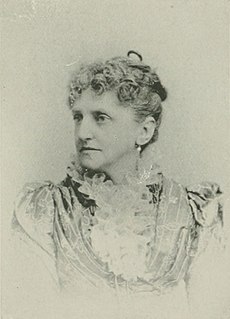A Quote by Lillie Devereux Blake
We are tired of the pretense that we have special privileges and the reality that we have none; of the fiction that we are queens, and the fact that we are subjects.
Related Quotes
There's no real objection to escapism, in the right places... We all want to escape occasionally. But science fiction is often very far from escapism, in fact you might say that science fiction is escape into reality... It's a fiction which does concern itself with real issues: the origin of man; our future. In fact I can't think of any form of literature which is more concerned with real issues, reality.
Will you not covet such power as this, and seek such throne as this, and be no more housewives, but queens? There is no putting by that crown; queens you must always be; queens to your lovers; queens to your husbands and sons; queens of higher mystery to the world beyond. . . . But alas! you are too often idle and careless queens, grasping at majesty in the least things, while you abdicate it in the greatest.
Reality and fiction are really mixed up. The frontier between reality and fiction is tremendously porous and slippery. And in fact, when I remember something that has happened to me a long time ago, let's say twenty years ago, many times I'm not sure if I have actually lived what I am recalling, or I have dreamed about it, or I have written about it, or I have imagined it all.
In fact, people seem to be tired of fiction now. There are so many other ways of exploring humanity - by ethnology, psychoanalysis, and so on. It's a little boring to make up stories. So many people think that it's better to be very close to reality and to recount one's life as it is rather than to fictionalize, as they say, that is to transpose, and therefore to cheat.
There are loads of sociopolitical, racial, class and future-planet situations that really interest me, but I'm not really interested in making a film about them in a film that feels like reality because people view that in a different way. I like using science fiction to talk about subjects through the veneer of science fiction.
This fact was something I also learned from this first novel that I needed personal experience to invent, to fantasize, to create fiction, but at the same time I needed some distance, some perspective on this experience in order to feel free enough to manipulate it and to transform it into fiction. If the experience is very close, I feel inhibited. I have never been able to write fiction about something that has happened to me recently. If the closeness of the real reality, of living reality, is to have a persuasive effect on my imagination, I need a distance, a distance in time and in space.
Literary science fiction is a very, very narrow band of the publishing business. I love science fiction in more of a pop-culture sense. And by the way, the line between science fiction and reality has blurred a lot in my life doing deep ocean expeditions and working on actual space projects and so on. So I tend to be more fascinated by the reality of the science-fiction world in which we live.
































